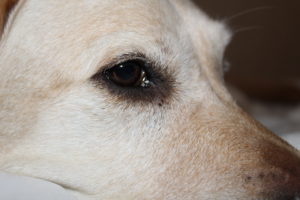Bailey stood, signaling our para transit bus was pulling to the curb. I praised him with a “good boy!” and he guided me to the door. We stepped up, and as I asked the driver which seat was open, a familiar voice greeted us. Bailey, being the most curious dog ever in the world, decided to try to sniff the passenger’s bag and I corrected him and direct him to back up into the space where he would be safe and away from temptation.
The passenger, whom I will call Sonya, announced she was going to my guide dog school to observe a graduation. She has been thinking about a guide dog for the past year since her vision has deteriorated. Whenever we meet on the bus, she spends the time asking me questions. I answer them. This time she asked the most familiar questions, the ones I asked all those years ago, when I first began the exploration of applying for a guide dog.
Questions like, was she blind enough for a dog? What if, on some days she walked a few miles and other days she just cleaned the house? Would a dog be able to be part of her life? She was also trying to describe a new harness my school used for running guides that resembles a Y with an adjustable handle. All these questions and she was finally going to a graduation to see for herself just how much a dog can enhance someone’s life and get a person back to being more independent. I was so happy she was taking a chance and evaluating her choices. Part of her reluctance was, how would a dog fit into her life and her family? How would she be able to show the dog what she wanted? Would the dog be able to be part of her extended family and be good with her grandchildren? Our conversation took on a very serious connotation, as if she was ready to make the commitment and apply or stick with the cane.
After she got off the bus, I thought about how, like Sonya, I got to a point of extreme frustration with a white cane, being exhausted from the mental vigilance and finding it a laborious tool, that, while helpful, also had its limits and had let me down. I think folks like us, who have lived with vision and then gradually lost it, are just unequipped to make a complete and successful transition to exclusively using a cane because our brains have aged and aren’t as flexible. I also hit my learning ceiling with braille in a similar fashion. I studied braille for six months with an instructor; After a 20-minute session of reading braille, I was mentally exhausted and could not move past the phenomenon. My fingers would get numb and my head felt like it was going to explode from concentrating so hard. For me, and many other folks who lose vision later in life, the adjustment to progressing from simple tactile reading to reading a novel is just too much for the brain to handle. Moreover, folks like me have already learned how to read and write visually; later on, as we lost more vision, thanks to computers and assistive technology we were able to transition to listening the way we had been taught to with sight. Folks like me just want to be able to manage vision loss and not be overwhelmed by it. But I digress.
Back to the dog or the cane discussion. Why is, one might ask, using a dog less stressful? A dog takes the adjustment to a different level, allows a person to share the mobility experience and be less vigilant. The handler relies less on constant tapping, stopping and realigning a path; with another sentient being, walking down a street goes from a singular effort a team effort. The partnership takes the stress off the person, and the experience of being out and about in public becomes more pleasurable and less isolating. The dog is the teams’ eyes, does the shore-lining, the obstacle avoidance, the targeting. The handler follows, directs, and keeps track of the team’s location.
I smile and think — how many times have I found myself talking to my dog? How many times have I thanked the Powers that I was a guide dog user after being redirected from a dangerous situation? How many times has my dog kept us from being hurt or worse? How many times did my dog find our way from a situation where I got lost? How many times has my dog comforted me, my clients, and provided unconditional regard to whomever needed it?
The answer is simple: I trust my dog and we are a team and no matter what we face, we will work through it together.
As for Sonya, whatever she chooses to do to manage living her life with vision loss, I hope that she stays active and engaged. Adjusting to losing sight takes time and I think Sonya is a brave and focused person for exploring all her options.




